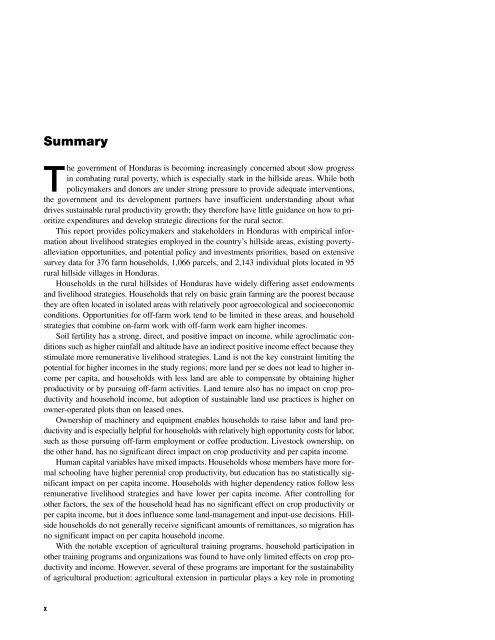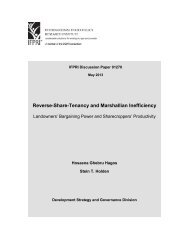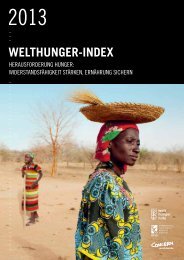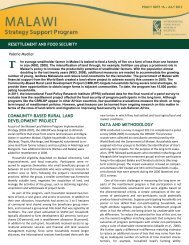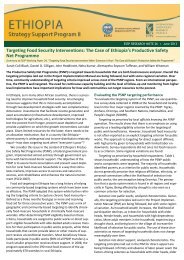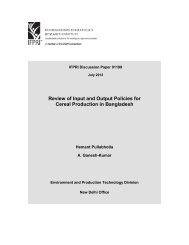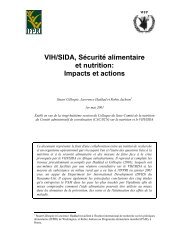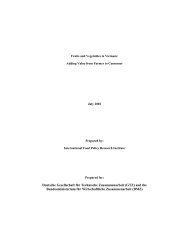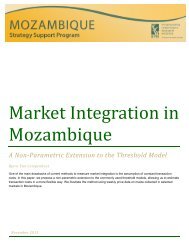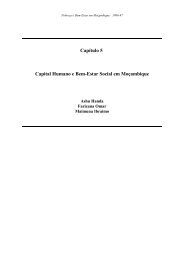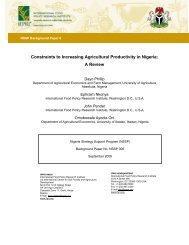Rural Development Policies and Sustainable Land Use in the ...
Rural Development Policies and Sustainable Land Use in the ...
Rural Development Policies and Sustainable Land Use in the ...
Create successful ePaper yourself
Turn your PDF publications into a flip-book with our unique Google optimized e-Paper software.
Summary<br />
The government of Honduras is becom<strong>in</strong>g <strong>in</strong>creas<strong>in</strong>gly concerned about slow progress<br />
<strong>in</strong> combat<strong>in</strong>g rural poverty, which is especially stark <strong>in</strong> <strong>the</strong> hillside areas. While both<br />
policymakers <strong>and</strong> donors are under strong pressure to provide adequate <strong>in</strong>terventions,<br />
<strong>the</strong> government <strong>and</strong> its development partners have <strong>in</strong>sufficient underst<strong>and</strong><strong>in</strong>g about what<br />
drives susta<strong>in</strong>able rural productivity growth; <strong>the</strong>y <strong>the</strong>refore have little guidance on how to prioritize<br />
expenditures <strong>and</strong> develop strategic directions for <strong>the</strong> rural sector.<br />
This report provides policymakers <strong>and</strong> stakeholders <strong>in</strong> Honduras with empirical <strong>in</strong>formation<br />
about livelihood strategies employed <strong>in</strong> <strong>the</strong> country’s hillside areas, exist<strong>in</strong>g povertyalleviation<br />
opportunities, <strong>and</strong> potential policy <strong>and</strong> <strong>in</strong>vestments priorities, based on extensive<br />
survey data for 376 farm households, 1,066 parcels, <strong>and</strong> 2,143 <strong>in</strong>dividual plots located <strong>in</strong> 95<br />
rural hillside villages <strong>in</strong> Honduras.<br />
Households <strong>in</strong> <strong>the</strong> rural hillsides of Honduras have widely differ<strong>in</strong>g asset endowments<br />
<strong>and</strong> livelihood strategies. Households that rely on basic gra<strong>in</strong> farm<strong>in</strong>g are <strong>the</strong> poorest because<br />
<strong>the</strong>y are often located <strong>in</strong> isolated areas with relatively poor agroecological <strong>and</strong> socioeconomic<br />
conditions. Opportunities for off-farm work tend to be limited <strong>in</strong> <strong>the</strong>se areas, <strong>and</strong> household<br />
strategies that comb<strong>in</strong>e on-farm work with off-farm work earn higher <strong>in</strong>comes.<br />
Soil fertility has a strong, direct, <strong>and</strong> positive impact on <strong>in</strong>come, while agroclimatic conditions<br />
such as higher ra<strong>in</strong>fall <strong>and</strong> altitude have an <strong>in</strong>direct positive <strong>in</strong>come effect because <strong>the</strong>y<br />
stimulate more remunerative livelihood strategies. L<strong>and</strong> is not <strong>the</strong> key constra<strong>in</strong>t limit<strong>in</strong>g <strong>the</strong><br />
potential for higher <strong>in</strong>comes <strong>in</strong> <strong>the</strong> study regions; more l<strong>and</strong> per se does not lead to higher <strong>in</strong>come<br />
per capita, <strong>and</strong> households with less l<strong>and</strong> are able to compensate by obta<strong>in</strong><strong>in</strong>g higher<br />
productivity or by pursu<strong>in</strong>g off-farm activities. L<strong>and</strong> tenure also has no impact on crop productivity<br />
<strong>and</strong> household <strong>in</strong>come, but adoption of susta<strong>in</strong>able l<strong>and</strong> use practices is higher on<br />
owner-operated plots than on leased ones.<br />
Ownership of mach<strong>in</strong>ery <strong>and</strong> equipment enables households to raise labor <strong>and</strong> l<strong>and</strong> productivity<br />
<strong>and</strong> is especially helpful for households with relatively high opportunity costs for labor,<br />
such as those pursu<strong>in</strong>g off-farm employment or coffee production. Livestock ownership, on<br />
<strong>the</strong> o<strong>the</strong>r h<strong>and</strong>, has no significant direct impact on crop productivity <strong>and</strong> per capita <strong>in</strong>come.<br />
Human capital variables have mixed impacts. Households whose members have more formal<br />
school<strong>in</strong>g have higher perennial crop productivity, but education has no statistically significant<br />
impact on per capita <strong>in</strong>come. Households with higher dependency ratios follow less<br />
remunerative livelihood strategies <strong>and</strong> have lower per capita <strong>in</strong>come. After controll<strong>in</strong>g for<br />
o<strong>the</strong>r factors, <strong>the</strong> sex of <strong>the</strong> household head has no significant effect on crop productivity or<br />
per capita <strong>in</strong>come, but it does <strong>in</strong>fluence some l<strong>and</strong>-management <strong>and</strong> <strong>in</strong>put-use decisions. Hillside<br />
households do not generally receive significant amounts of remittances, so migration has<br />
no significant impact on per capita household <strong>in</strong>come.<br />
With <strong>the</strong> notable exception of agricultural tra<strong>in</strong><strong>in</strong>g programs, household participation <strong>in</strong><br />
o<strong>the</strong>r tra<strong>in</strong><strong>in</strong>g programs <strong>and</strong> organizations was found to have only limited effects on crop productivity<br />
<strong>and</strong> <strong>in</strong>come. However, several of <strong>the</strong>se programs are important for <strong>the</strong> susta<strong>in</strong>ability<br />
of agricultural production: agricultural extension <strong>in</strong> particular plays a key role <strong>in</strong> promot<strong>in</strong>g<br />
x


